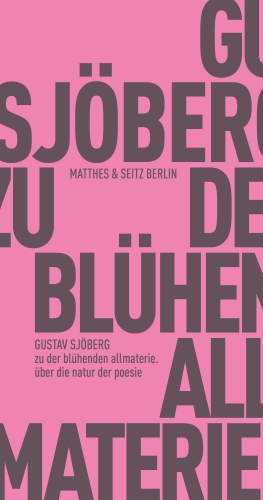According to a classical aesthetic model, the artist shapes a matter he finds, thus molding nature into art, giving form to matter. Sculpture follows this model, but poetry is also always seen in such a perspective. For what distinguishes a poem from a non-poem, poetry from what is not poetry? Although throughout history various attempts to determine precisely the nature of poetry have gradually proved untenable, in the end there always remains an implicit notion of human activity - the idea that the poet in some way organizes non-poetic matter and turns it into poetry. In this poetic essay, Gustav Sjöberg, drawing on the thoughts and concepts of Marsilio Ficino, Giordano Bruno, Dante Alighieri, Ernst Bloch, among others, traces the fundamental distinction between form and matter, which can be traced back to Aristotle, as well as its still unbroken influence on concepts such as "art" and "poetry," which Sjöberg frees from their mental cage with this essay.
Gustav Sjöberg is a poet living in Stockholm.
"[Sjöberg] spreads out a wealth of philosophical and literary sources, which he brings into surprising constellations with a sense for historical differences." - Maximilian Gilleßen, Frankfurter Allgemeine Zeitung







